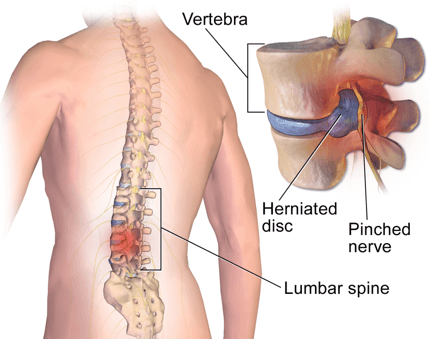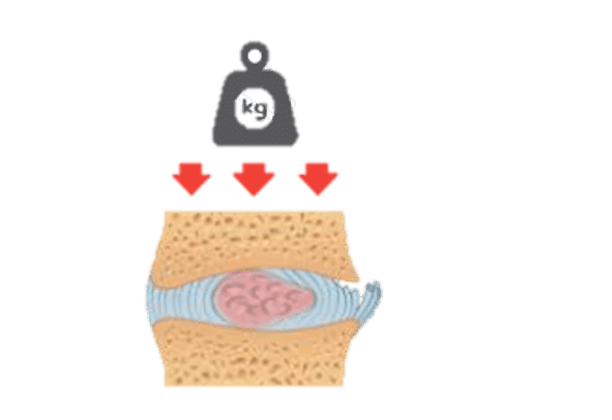Request Appointment
Enter your details and we will be in touch with you shortly;
Or call 08655885566 between 8 am and 8 pm.

Pain in lower back that is often accompanied by radiating hip and leg pain

Lower back pain or ‘Lumbago’ pain comes from muscle strain, tension or injury in the lower back, usually affecting the bones, discs, nerves or spine muscles. The lumbar spine (lower back) is very susceptible to injury. Depending upon the injury sustained by the muscles, ligaments, discs, joints, or vertebrae, symptoms may vary. But the most common ones are:
Get immediate medical care if:
These symptoms could be indicating a deeper issue.
Lower back pain is one of the leading causes of disability worldwide. The lower back or lumbar spine provides support, strength, and flexibility while performing various activities of daily living. Muscles around the spine help in maintaining the spinal alignment and also offloads the extra stress it bears. Lower back pain comes with its disabling effects on the human body when not taken care of. Hence it becomes really important to get it treated in time.
 Professional diagnosis required
Professional diagnosis required Chronic, can last for years
Chronic, can last for years Treatable with 4 weeks of QI Spine Therapy
Treatable with 4 weeks of QI Spine TherapyLumbago pain is the most common type of back pain and occurs because of either mechanical or non-mechanical in nature.
Most Lower Back Pain is mechanical in nature i.e. it originates in the soft muscle tissue which supports the spine. A Spine Function Test like the Digital Spine Analysis may be recommended identifying and isolating the pain area.
 Professional diagnosis required
Professional diagnosis required Chronic, can last for years
Chronic, can last for years Treatable with 4 weeks of QI Spine Therapy
Treatable with 4 weeks of QI Spine TherapyThe most important thing about back pain is an accurate and timely diagnosis. Once that’s done:
Every back pain case is different and so is the treatment for it. If left untreated it can get worse over time. It is best you consult a spine specialist as soon as pain symptoms appear.
After finding the root cause of the problem, a specific muscle rehabilitation program is designed based on the patient’s condition and symptoms.
You can very well avoid or prevent low back pain with the following simple, self-help strategies which can also be effective in preventing the recurrence of back pain.
You should seek medical care if you face the following signs: -
 Professional diagnosis required
Professional diagnosis required Chronic, can last for years
Chronic, can last for years Treatable with 4 weeks of QI Spine Therapy
Treatable with 4 weeks of QI Spine TherapyThe most important thing about back pain is an accurate and timely diagnosis. Once that’s done:
Every back pain case is different and so is the treatment for it. If left untreated it can get worse over time. It is best you consult a spine specialist as soon as pain symptoms appear.
 Professional diagnosis required
Professional diagnosis required Chronic, can last for years
Chronic, can last for years Treatable with 4 weeks of QI Spine Therapy
Treatable with 4 weeks of QI Spine TherapyThe most important aspect of treating lower back pain is obtaining an accurate diagnosis that pinpoints the underlying cause of low back pain.
For an accurate diagnosis, your physician may ask for your medical history and a detailed description of your symptoms. You will be asked about the current symptoms, posture, activity level, and recent injuries.
The doctor will also conduct a thorough examination which includes neurological examination and musculoskeletal examination.
If the cause of lower back pain is still unclear or more information is needed then, you may be asked to get a few imaging tests done. Common imaging tests are: -
In the Qi spine clinic, the diagnosis is done by asking the patient’s history, conducting a thorough physical examination, and doing DSA (Digital Spine Analysis test) which helps in analyzing the root cause of the problem. It is a non-invasive functional test that helps in measuring spine function. Its controlled and guided movements help in determining the mobility of the spine, strength, and imbalances of muscles around the spine.
 Professional diagnosis required
Professional diagnosis required Chronic, can last for years
Chronic, can last for years Treatable with 4 weeks of QI Spine Therapy
Treatable with 4 weeks of QI Spine Therapy






Have a question?
Ask our spine specialists
Who is a QI Spine Specialist?
A QI Spine Specialist is a medical expert with

Dr. Nidhi Sanghvi Shah

Dr. Manisha Moorjani

Dr. Shital Gaikwad

Dr. Richa Bhatia
9000 hours
of specialisation in treating back and neck conditions
32 hours
of spine physiotherapy specialisation methods in McKenzie concepts, Kinetic control, Neurodynamic solutions, Mulligan’s concepts
500 hours
and 6 months of QI Spine specialisation courses
Usually, low back pain gets resolved on its own within 1 or 2 weeks. But, if it doesn’t improve, you should get it treated with the help of a spine specialist.
Running or jogging worsens the pain. Consult your physician before doing such an activity.
Sometimes, it may not be possible to pinpoint the root cause of pain. However, many reasons like bad posture, lifestyle habits, or injuries might cause low back pain.
The best sleeping position while having lower back pain is on our side with partial bending of the knees. Keeping your knees bent will help balance the body and reduce pressure on the lumbar spine. You can also keep a small pillow between your knees.
You should consider walking as it’s a low-impact aerobic exercise and may help in reducing low back pain. But, if walking is one of the aggravating factors of your pain, it should be avoided.
At times, lower back pain may be related to cancer. It is one of the first symptoms of cancer and you should be cautious if you face additional symptoms such as fever, sudden weight loss, or neurological symptoms along with low back pain.
Back pain is related to barometric pressure and outdoor temperature. In general, muscles and joints react to the environment, which can make them stiff. Also, pressure changes can cause joint pain.
Major lifestyle factors that may alter the chances of developing low back pain are obesity, smoking, lack of physical activity, poor posture.
Practicing specific asanas or poses may help in relieving you from lower back pain. Yoga helps in improving the flexibility of muscles. It also improves posture. Breathing exercises can relieve stress. Check with your physician to know the asanas that benefit you in providing lower back pain relief.